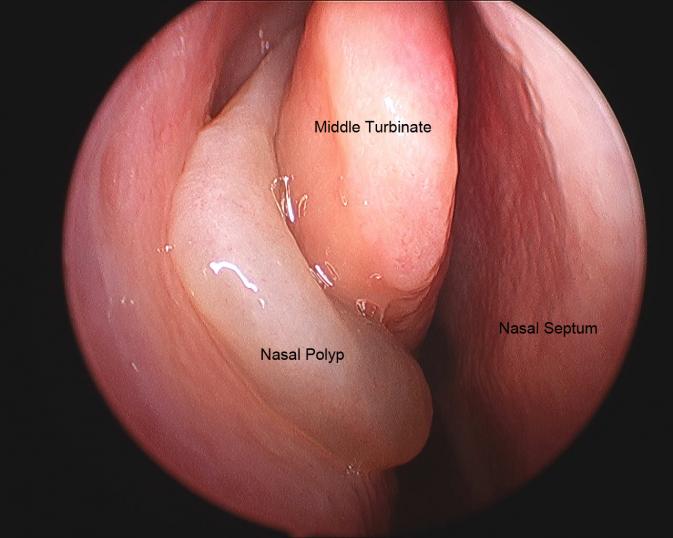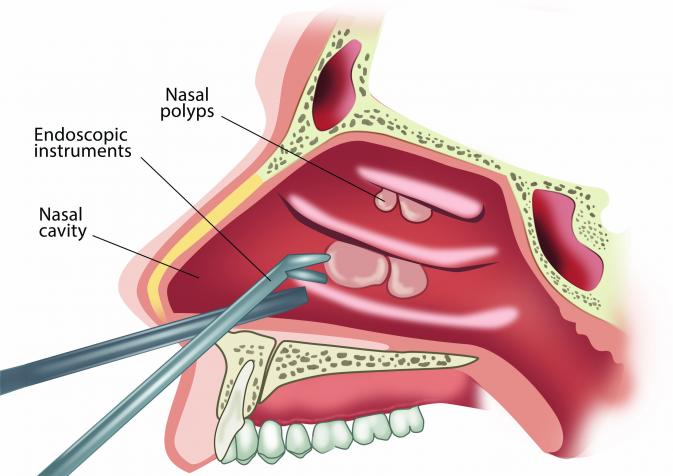
Nasal polyps are soft, painless and non-cancerous growths that develop in the sinuses and eventually also in the nose due to an inflammation of the mucosa.
Chronic sinusitis can exist with or without nasal polyps.
It is still unclear why some patients develop nasal polyps and others do not.
Nasal polyps may not cause any symptoms, especially if they are small. However, larger ones can block the normal drainage of the sinuses, resulting in the accumulation of mucus, which makes sinuses more easily infected.
In addition, chronic rhinosinusitis with nasal polyps causes an inflammation of the olfactory (smell) mucosa that leads to a reduced sense of smell.
The goal of nasal polyps’ treatment is to reduce the inflammation that causes the polyps. When the inflammation is reduced the polyps become smaller or sometimes even disappear. If polyps do not sufficiently shrink or disappear surgery may be necessary. The use of medication represents the first line treatment, and surgery (=polyps removal) is recommended as second line treatment.
Nasal corticosteroids: Corticosteroid nasal sprays are generally prescribed to reduce the inflammation. This treatment may shrink the polyps or eliminate them.
Oral corticosteroids: If a nasal corticosteroid is not effective, oral corticosteroid may be prescribed. Because oral corticosteroids can cause serious side effects, they are generally taken only for a limited period of time.
Antibiotics: Antibiotics may be prescribed in case of chronic and recurring infection of your sinuses. Some antibiotics also have anti-inflammatory properties which may reduce the inflammation of your sinuses as well as the polyps size.
Antihistamines: If you suffer from allergies, antihistamines may be prescribed to help reducing the allergic inflammation of your sinuses and nose.
Biologicals: Biological drugs are promising novel treatments (new molecules) currently being tested to reduce the size of nasal polyps in patients with chronic rhinosinusitis.

The standard procedure to remove nasal polyps is Functional Endoscopic Sinus Surgery (FESS). The surgeon will insert a small tube with a tiny camera into the nostrils and guide it into the sinus cavities and the polyps will be removed. During the operation, the surgeon may also remove the disease in additional key areas in order to restore adequate aeration and drainage of the sinuses. Endoscopic surgery is usually performed as an outpatient procedure.
Note that even after surgical removal of the nasal polyps, the inflammation may still remain. Therefore, to improve your smell it is important to continue your medications, because they reduce the inflammation of the olfactory mucosa.
Why do nasal polyps grow back after surgery?
Chronic rhinosinusitis with nasal polyps is a chronic disease. This condition will need constant treatment with corticosteroids to prevent worsening of the symptoms. Unfortunately, in some cases, even the nasal sprays with corticosteroids are not strong enough to suppress the polyp growth.
Classical nasal polyps that are seen in conjunction with chronic rhinosinusitis do not develop into malignant tumors. However, other types of polyp-like structures can be present in the nasal cavity that might be or turn into malignant tumors. Therefore it is of the utmost importance that nasal polyps are adequately examined and followed up by means of nasal endoscopy and if necessary, by different types of scans. Extra vigilance is needed in case of one-sided symptoms, nasal bleedings, deformations of the face and severe pain.